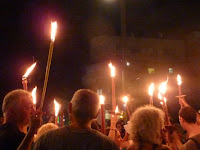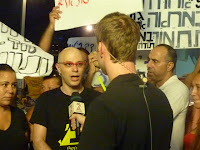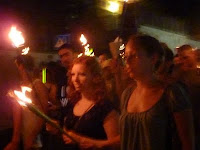 |
| March of silence (photo by H. Schenker) |
For five encouraging and enchanting weeks, the mass summer tent protest movement for social justice has dominated the Israeli headlines — until Thursday, August 19th, when an extremist group in Gaza, the Popular Resistance Committees, decided to launch an attack on the southern border, killing eight Israelis. The attack was a challenge to the Israeli government, to the Palestinian Authority leadership, to the Egyptian authorities trying to maintain control of Sinai, and even to Hamas.
 |
| Keeping the flame alive |
For the Israeli protest movement, the attack punctured the momentum that had been building up, with every weekend producing new, creative ideas for how to move forward.
 |
| The struggle will continue |
On Friday morning I went to the Rothschild Blvd. tent encampment “command post”, and was assured that the activists have no attention of giving up – the struggle will continue, despite the call by Deputy Minister Ayub Kara (Likud) and others that the activists should fold up their tents, since now was a time for the nation to come together to face the new security crisis. Kara is a “Druze Zionist”, holier than Pope, whose hyper-nationalistic positions can sometimes make even Netanyahu sound moderate.
 |
| With quiet determination |
Heading out, I ran into Prof. Nissim Kalderon, and complimented him on his article on Y-Net, the website of Yediot Ahronot, in which he said that for years we in the Israeli peace movement had failed to move the masses, and this younger generation had succeeded. “Maybe they know something that we didn’t,” and we should respect that, and not try to impose our agenda on them. “Do you know what the key expense used to be for Peace Now rallies?” he asked. I didn’t, and he said “the ads in the newspapers! And notice, that all that has happened this summer, took place without a single ad! Only Facebook and e-mail communication!” The power of social media.
Rona said that she hesitated about going ahead with the performance, given the tragic violence and loss of life in the south, but since her songs are anyway rather melancholy, she decided that the show must go on. She opened with the title song of her new album, Hamra’ot V’nichitot (Departures and Arrivals), which begins with the line “Good news and disasters…this time something exploded…” And she concluded with her well-known Mabul (Flood, the English version is called Earthquake), with the line “we’ll survive the flood,” with much of the audience singing along with her, in whispers. One of the tent protest organizers called out from the entrance – “Rona, tell them that there’s going to be a March of Silence tomorrow evening,” and always ready to give her time in defense of democracy, human rights and peace, she repeated the message into the mike.
 |
| All photos by H. Schenker in Tel Aviv |
On Saturday evening about 10,000 people gathered at Habima Square near the tent protest headquarters at the end of Rothschild Blvd., and marched silently through the streets of Tel Aviv, carrying flaming torches and a mixture of makeshift and professional signs, with police motor-cycles with bright blue headlights leading the way and making sure that the traffic wasn’t interrupted. “Make Welfare Not War”, “The Protest Will Continue”, “There’s no Personal Security without Social Security”, “Tycoons Beware, the Poor are Coming”, “Single Mothers from the Hatikva Quarter Demand Social Justice”, “The March of Silence – The Pain belongs to all of us, the Protest belongs to all of us”, “Bibi there is a state outside of Tel Aviv”, a big red heart with the slogan “Identifying with the South”, a bi-lingual sign in Hebrew and Arabic – “Needed – Public Housing”, “Peace for All” with Jewish, Christian and Moslem symbols, “Only Together will we Overcome”, “Social Justice for All”, “Revolution! 7 Million People are Waiting for your Reply Bibi”, “Bread, Work and Peace”, “We won’t let terror win, continuing with the protest!” “Barak, wipe that smile off your face. We’re staying in the streets,” and even a sign held up by Rabbis for Human Rights, “Solidarity with the people in the south and in Gaza.”


Dear Hillel,
Can you please provide evidence to support your assertion that the Eilat attackers were from the Popular Resistance Committees, or even Gaza? At this point, there has been no evidence provided to that end, and there’s in fact evidence suggesting the contrary. See for example:
http://972mag.com/barak-and-netanyahu%e2%80%99s-story-doesn%e2%80%99t-add-up/
Would it not be wiser to take government claims on these types of issues with some skepticism, rather than swallowing them whole and repeating them to the public?
Ted
Where exactly the attackers came from is not germane to Hillel’s point. Hillel is reporting the fact that such attacks threaten the momentum and unity of the protest movement.
Dear Ralph,
I’m finding it hard to accept that it would not be germane that Hillel asserted as fact who was responsible for killing eighr Israelis in Eilat when, until now, no one has released convincing information on responsibility, and Israel went on to kill how many Gazans in “retaliation?”
Is it not germane that the entire basis for Israel’s attacks on Gaza may have been unfounded and the many Palestinian killed, most already difficult to justify, also may have been without the basis that Israeli government claimed?
This is exactly the way many Israel/Palestinian have gravely escalated into large-scale conflicts, based on flimsy claims by the Israeli government that then become repeated as facts around the world (as Hillel has lazily done here). But I guess getting at the truth and educating the public are not germane in your book.
Ted
Let me try again: If Hillel, a veteran peace activist with ties to numerous Palestinian activists, had thought that the so-called Popular Resistance Committees in Gaza were not involved, he would have said so. But who the attackers were is not germane to Hillel’s post. He’s raising the point that any such attacks risk diverting and splitting the popular protest movement.
Dear Ralph,
If Hilel had serious ties to numerous Palestinian activists who know anything, he would not have lazily repeated the claim that the Popular Resistance Committees were responsible for the Eilat attacks.
Amira Hass is not the only source possible, but I use her here as one example of someone whse reports I can quickly find who does have real contacts with Palestinian activists, particularly in Gaza. Perhaps you’d care to dispute that she does?:
http://www.haaretz.com/print-edition/news/doubts-emerge-over-identity-of-terrorists-who-carried-out-attack-in-israel-s-south-1.380525
“It has been one week since the terror attacks near Eilat, and there is no sign of the traditional mourners’ tents for the relatives of militants killed by the Israel Defense Forces, or indeed any reports of Gazan families who are grieving as a result of IDF actions near the Egyptian border last Thursday. Nor were there reports of families demanding the return of their loved ones’ bodies for burial. A longtime social activist told Haaretz that even in the event that families were instructed to conceal their grief, news like that is difficult to hide in the Strip.”
“The absence of mourners’ tents reinforces the general sense in the Strip that the perpetrators of the attack were not from Gaza, contrary to Israeli defense establishment claims. Gazans also doubt that members of the Popular Resistance Committees and their military wing (the Nasser Salah al-Din Brigades ) were behind the attack. Support for this view can be seen in a report on Monday by the Egyptian daily Al-Masry Al-Youm, according to which Egyptian security forces had identified three of the planners as Egyptians. A PRC spokesman responded to the report by announcing that the organization “praised” the attack but had not planned it.”
If I spent 15 more minutes researching, I could also quote Palestinian activists saying the same thing rather than requiring a very knowledgeable(Amira), or a dubiously qualified (Hillel) Israeli to interpret for them.
Again, there is no reason to swallow and repeat until now unsupported Israeli government assertions about who carried out the attacks in Eilat. The Israeli military even has some of the bodies of those who carried out the attacks. Seems they could probably prove where those attacksers were from by now if it was in their interest to do so.
Ted
I get Ted’s point, but he doesn’t get mine or Hillel’s. Regardless of who attacked or from where, violence against Israel and Israelis threatens to undermine Israel’s social protest movement.